"I think we can come to terms."
Gaston's nostrils quivered, his moustache twitched. He lowered his bluish eyelids, hiding the intolerable brilliance of his protruding eyes.
"Do you mean to say that I can now relieve Susanne of my services?"
"Yes, Gaston."
He bent over the table and squeezed his glass tightly between his fingers.
"Will my moustache smell of your skin?"
"I imagine that's unavoidable, Gaston."
"All right." He leaned back. "All right. It shall be as you wish."
Dinner was over. Coffee with hundred-year-old cognac had been drunk. The Corona-Corona-—at two dollars a cigar—had been smoked half-way through and the ash had not yet fallen. The critical moment had come: what next? With what Satanic bow to play some jolly tune on jaded nerves?
Rolling demanded the programmes of all the Paris amusements.
"Do you want to dance?"
"No," answered Zoe, covering half her face with her fur.
"Theatre, theatre, theatre," read Rolling. They were all boring: a three-act dialogue comedy in which the actors were so bored and disgusted that they did not even bother to make up and actresses in toilettes from famous dressmakers stared at the audience with vacant eyes.
"Revue, Revue. Here: Olympia. A hundred and fifty nude girls wearing only slippers and a technical miracle, a wooden curtain designed as a chess-board on which nude women stand as it is raised and lowered. Shall we go there?"
"My dear, they're all bandy-legged, girls from the boulevards."
"Apollo... We haven't been there. Two hundred girls wearing only... We'll give that a miss. Le Rouleau. More women. Aha! What about the 'World-Famous Musical Clowns Pirn and Jack'?"
"They are talked about," said Zoe, "let's go there."
They took a stage box. When they entered the Revue was under way.
A volatile young man in immaculate evening dress and a mature woman in red with a broad-brimmed hat and a long staff were exchanging good-natured impertinences about the government and innocent witticisms at the expense of the Prefect of Police, were charmingly mocking in respect of high-currency foreigners, but not enough to make them want to leave Paris immediately and advise their friends not to come to that city of joy.
After some more chatter on politics during which they kept their legs moving all the time, the young man and the lady with the staff exclaimed, "Houp-la." Girls with extremely white bodies, as naked as the day they were born, wearing only their powder, ran on to the stage and arranged themselves in a tableau vivant depicting an army in attack. The orchestra played a brave fanfare and there was a blare of bugles.
"That ought to affect the young men," said Rolling.
"It doesn't work when there are so many women," answered Zoe.
The curtain was lowered and raised again. A property grand piano placed near the footlights occupied half the stage. With a clatter of percussion instruments Pirn and Jack appeared. Pirn was in the conventionally ridiculous evening jacket, a vest that reached his knees and trousers that would not keep up, boots a yard long that ran away ahead of him (applause), and with the face of a kindly idiot. Jack was covered in flour, a high felt cap on his head and a bat hanging from his backside.
To begin with they did everything to create roars of laughter; Jack smacked Pirn's face and Pirn blew out a cloud of dust from behind, then Jack hit Pit on the head and raised a big rubber blister.
Said Jack, "Listen, d'you want me to play on that piano?" Pirn laughed terrifically and said, "All right, play on that piano," and went away and sat down. Jack banged at the keys with all his might and the tail fell off the piano.
Pirn again burst into a terrific laugh. Jack banged the keys a second time and the side fell off the piano. "That's nothing," said Jack and slapped Pirn's face. Pirn staggered all the way across the stage and fell. (Boom! went the big drum.) Pirn got up. "That's nothing," he said and spat out a handful of teeth, took a brush and shovel (of the sort used for picking up horse-dung in the streets) out of his pocket and set about brushing his clothes. Jack banged the keys for a third time and the piano fell to pieces; underneath was an ordinary concert piano. Pushing his felt cap down over his nose, Jack, with incomparable mastery, gave an inspired performance of Liszt's "Campanella."
Zoe's hands went cold. Turning to Rolling she whispered:
"What an artist!"
"That's nothing," said Pirn when Jack had finished. "Now listen to me."
He began pulling out of his various pockets ladies' knickers, an old shoe, a clyster-tube, a live kitten (applause), and at last a violin; with the sad face of a kindly idiot he turned to the public and played an immortal etude by Paganini.
Zoe got up, threw her furs round her neck, her diamonds sparkled.
"Let's go, this is sickening. Unfortunately I also was once an artiste."
"Where can we go, baby! It's half past ten."
"Let's drink."
A few minutes later their limousine pulled up in a narrow street in Montmartre that was lit up by the ten windows of the den known as the Souper de Roi. In the low, hot, smoky hall, draped in scarlet silk, mirrors on walls and ceiling, amidst streamers, celluloid balls and confetti, half-naked women were dancing, entangled in the paper ribbons, while men, red-faced or pale, drunken and excited, pressed their faces to the rouged cheeks of their partners. A piano rattled. Violins wailed and three perspiring Negroes banged on wash-bowls, pumped motor horns, beat wooden boards, rang bells, clattered plates, and bashed a kettle-drum. Somebody's wet face pushed close up to Zoe. A woman's arms wound round Rolling's neck.
"Make way for the Chemical King, mes enfants," shouted the maitre d'hotel, with the greatest of difficulty finding them places behind a narrow table placed along a silk-hung wall. As Zoe and Rolling sat down, celluloid balls, confetti, and streamers flew at them.
"You're attracting attention," said Rolling.
Zoe, her eyes half closed, was drinking champagne. She felt hot and damp under the light silk that scarcely covered her bosom. A celluloid ball hit her in the cheek.
Slowly she turned her head—a man's dark eyes, so dark that they seemed to be outlined in charcoal, were peering at her in sullen admiration. She leaned forward, lay her bare arms on the table and drank in that look as though it were wine: did it really matter what she got drunk on?
The face of the man who was staring at her seemed to shrink in those few seconds. Zoe rested her chin on her interlocked fingers and met the man's stare through half-open eyes... She had seen him somewhere before. Who could he be? He was neither English nor French. His dark beard was dotted with confetti. He had a fine mouth. "I wonder whether Rolling is jealous?" she asked herself.
A waiter forced his way through the dancing crowd and handed her a note. In her astonishment she fell back in her seat and before she read it glanced sideways at Rolling who sat sucking his cigar.
"Zoe, that man you are looking at so tenderly is Garin... I kiss your hand. Semyonov."
She must have turned terribly pale for a voice near by said above the noise, "Look, that lady's ill." Then she held out her empty glass and the waiter filled it with champagne.
"What did Semyonov write?" asked Rolling.
"I'll tell you afterwards."
"Was it something about that fresh guy who's staring at you? That's the one who came to see me yesterday. I had him thrown out."
"Rolling, don't you know him? Don't you remember the Place de 1'fitoile? That's Garin!"
Rolling only sniffed. He took his cigar out of his mouth, "Aha." His face suddenly changed: he looked the same as he did when he walked up and down the silver carpet of his office thinking out every possible combination in the game five moves ahead. That time he had snapped his fingers energetically. But now, on this occasion, he turned to Zoe, his mouth distorted.
Читать дальше
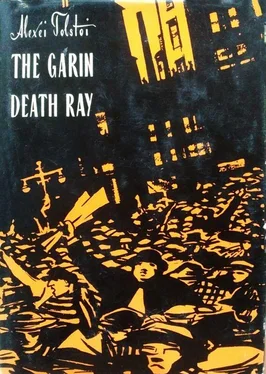
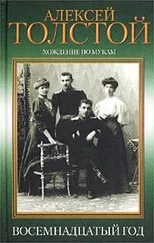

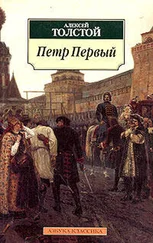
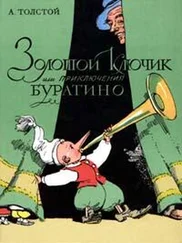
![Алексей Николаевич Толстой - Хождение по мукам [litres]](/books/26263/aleksej-nikolaevich-tolstoj-hozhdenie-po-mukam-litr-thumb.webp)
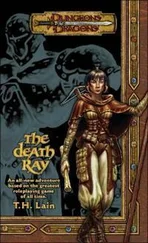

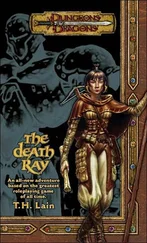


![Алексей Николаевич Толстой - Гиперболоид инженера Гарина. Аэлита [Художник Г. Зубковский]](/books/423486/aleksej-nikolaevich-tolstoj-giperboloid-inzhenera-ga-thumb.webp)
